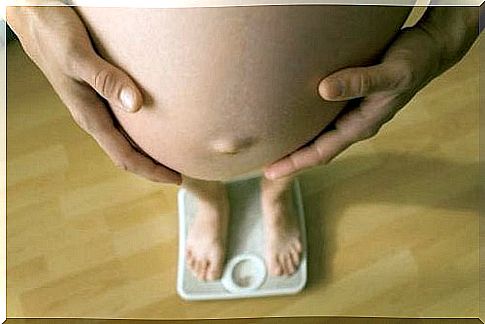What If My Baby Weighs A Lot And Is Not Yet Born?

Many babies come into this world weighing over four kilos, which is called macrosomia. In addition to complicating the delivery process, this characteristic can favor the emergence of some health conditions. So what can be done if my baby weighs a lot and is not yet born?
In order to avoid future complications, some mothers ask themselves, before delivery, what measures should be taken in relation to the baby’s excess weight.
Babies suffering from macrosomia are called “large for gestational age” or LGA for its acronym in English.
A baby is considered to exceed its normal weight when, close to the date of birth, it weighs 4 or 4.5 kilograms. The Spanish Association of Pediatrics states that the 90th percentile is the measure used for this parameter.
Therefore, it is estimated that a baby has this characteristic when his weight exceeds this measure. It will therefore be heavier than 90% of children of the same gestational age.
It is possible to know the weight of the fetus before its arrival in the world thanks to studies such as ultrasonography and posterior calculations, based on the abdominal circumference, the head size and the femur length of the fetus.
However, there is a margin of error of approximately 500 grams.
What causes macrosomia?
Before explaining what actions can be taken in these cases, it is important to know more about macrosomia and large-for-gestational-age babies. First, we’ll describe its possible triggers:
- Genetics : if parents are predisposed to obesity, it is possible that the baby will inherit this predisposition and manifest it before birth.
- Mother’s weight : being overweight during pregnancy can lead to an excessive weight of the fetus.
- Mother’s diabetes : this disease generates hormonal imbalances that cause excess sugar in the fetus’ body. So your weight increases.
- Time of pregnancy : when you reach week 40 of pregnancy, the baby may have grown too.
- Previous pregnancies : because of them, the placental pathways that transport nutrients may be more dilated, which promotes the growth of the fetus.

In addition, it also influences factors such as the mother’s age, nutritional status, socioeconomic conditions and possible genetic diseases that the baby suffers from, such as Weaver syndrome, Sotos syndrome and the like.
possible consequences
While it is perfectly feasible for a baby who is very heavy to be born without problems, birth complications and future health risks can also occur.
Obstetric trauma is common, as are shoulder dystocia and brachial plexus injury. In the first, the baby’s shoulder is trapped in the birth canal after the head has passed. This often resolves, causing a fracture of the collarbone to take the shoulder out of the maternal pelvis.
In these circumstances, the mother can suffer birth injuries, hemorrhages, complications from the administration of anesthesia and infections in adjacent organs. In the future, the baby may have a higher risk of developing certain diseases, such as:
- Diabetes
- Breathing problems due to the lack of maturation of the lungs.
- Polycythemia and conditions derived from excess red blood cells.
Also, the likelihood of miscarriage is greater when a baby weighs a lot. Some causes can be lack of space in the uterus, compression of the umbilical cord or the inability to deliver the nutrients necessary for its maturation to the fetus.

My baby weighs a lot and the time for delivery hasn’t arrived: what do I do?
Once macrosomia is detected, there is relatively little to do except modify the type of delivery. However, given the causes of this disorder, there are some recommendations to avoid this type of problem.
Perhaps most important is controlling the weight of the mother and fetus. To avoid complications, it is recommended to have a healthy and varied diet that meets the requirements of the gestational phase.
Likewise, it is necessary to control the mother’s blood glucose levels. This will prevent cases of gestational diabetes in women who have never had this type of problem.
If the cause of a fetus weighing a lot is a prolonged pregnancy, the doctor may recommend an induced birth.
As we pointed out earlier, once the time for delivery arrives, a normal measure is to perform a cesarean, as long as it is possible. Thus, complications such as those mentioned above are avoided and the life of the mother and baby is preserved.









